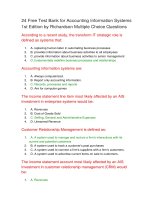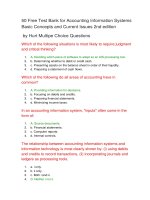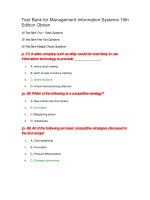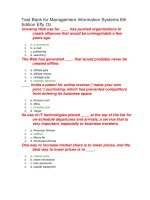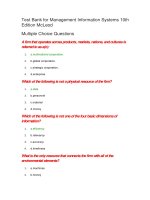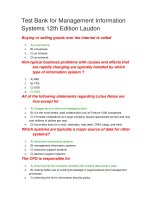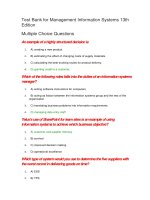Test bank for accounting information systems 10th edition
Bạn đang xem bản rút gọn của tài liệu. Xem và tải ngay bản đầy đủ của tài liệu tại đây (354.71 KB, 51 trang )
Test Bank for Accounting Information Systems 10th Edition
ERP II adds an Enterprise Application Suite (EAS) to aid in the communication
between functional areas.
1. True
2. False
Business processes are always triggered by some economic event, and all
have clearly defined starting and ending points.
1. True
2. False
A key characteristic and benefit of business processes is that they are always
limited to one functional area of the information system.
1. True
2. False
Analyzing a company's value chain aids in the identification of a company's
competitive advantages.
1. True
2. False
Operational transaction cycles have traditionally grouped activities of a
business into six common operational processes.
1. True
2. False
Transactions are used by auditors to verify account balances and internal
controls.
1. True
2. False
The accounting and finance functions should not be segregated in order to
increase a company's internal control.
1. True
2. False
The director of internal auditing should report directly to the controller of the
company.
1. True
2. False
The treasurer is responsible for the budgeting and tax planning aspects of a
business.
1. True
2. False
Systems programmers usually report to the Manager of Systems
Analysis.
1. True
2. False
A steering committee consists of high-level members of user functions such
as manufacturing and marketing, as well as the head of the information
system function and several of his or her staff.
1. True
2. False
An information center is a support facility for end users in an
organization.
1. True
2. False
DBMS is the hands-on use of computers by end users.
1. True
2. False
Information system specialists are used in the traditional approach to data
processing for end users.
1. True
2. False
EDI is a key component to quick-response technology system.
1. True
2. False
The philosophy that one should do the right thing the first time is better
known as TQM or TQP.
1. True
2. False
RFID tags are used for tracking objects within a quick-response system.
1. True
2. False
Only active RFID tags transmit signals containing digital information to
receivers.
1. True
2. False
Lean manufacturing focuses on eliminating waste from the entire value
chain.
1. True
2. False
A just-in-time manufacturing system is one form of lean manufacturing.
1. True
2. False
Microsoft sponsors the Web TrustTM seal of approval to certain web sites that
meet their security and integrity criteria.
1. True
2. False
Electronic data interchange (EDI) is the direct computer-to-end-user exchange
of business documents via a communications network.
1. True
2. False
ANSI X.12 is a public EDI standard.
1. True
2. False
The SEC requires that all companies must file their financial reports
electronically using XBRL.
1. True
2. False
FedWire is a retail EFT system used for telephone wire transfers and
payments.
1. True
2. False
E-waste refers to dollars spent on unsuccessful implementations and
technologies.
1. True
2. False
Green IT states system design should include a plan for recycling and reusing
system components.
1. True
2. False
A system is a collection of related resources designed to help a company
achieve specified objectives.
1. True
2. False
Accounting information systems are designed to gather and utilize
information which may cost more to provide than it is worth to the user.
1. True
2. False
The basic goal of accounting information systems is to convert financial data
into information.
1. True
2. False
Examples of the information provided by a financial information system are
cash flow summaries and payment information.
1. True
2. False
All data processed and information stored in an accounting information
system are mandatory for financial reporting purposes.
1. True
2. False
A typical CRM contains one common database in which all departments with
customer contact can access and update.
1. True
2. False
A typical CRM contains one database for each department which has customer
contact.
1. True
2. False
An extended enterprise brings suppliers and customers together in order to
meet customer demand while minimizing supplier costs.
1. True
2. False
Procurement and firm infrastructure are examples of primary business
processes.
1. True
2. False
Good documentation means that records should be maintained by all parties
involved in a transaction.
1. True
2. False
Some organizations that use computers to process transactional data must
have an information system function.
1. True
2. False
The operations function allows specialization in areas such as operating
systems and software and communications technology.
1. True
2. False
Personal computers give end users their own processing power.
1. True
2. False
Most batch processing environments are JIT environments.
1. True
2. False
XBRL is a language that facilitates the exchange over the Internet of all kinds
of business documents and financial statements.
1. True
2. False
External users of accounting information include investors, customers,
governmental agencies, and suppliers.
1. True
2. False
The functional components of a management information system (such as
marketing, manufacturing, human resources, and financial) are logically
independent.
1. True
2. False
A decision support system (DSS) is tailored to the strategic information needs
of top-level management.
1. True
2. False
The AIS benefits of information technology include automation, information
organization, and communication.
1. True
2. False
AIS application architecture currently focuses on automating the traditional
accounting cycle.
1. True
2. False
MRP and MRP II software was created to aid in Supply Chain Management
(SCM).
1. True
2. False
In CIM systems, computers control management designed parts of the
manufacturing process.
1. True
2. False
Flexible manufacturing systems can be reprogrammed to produce entirely
different products.
1. True
2. False
The process management approach aids in the management and
improvement of a company's processes in order to increase customer
satisfaction while ignoring the company's cost structure.
1. True
2. False
ERPs should reduce data duplication, increase communication between
functional areas, and reduce complications of software updates.
1. True
2. False
ERPs can either be industry-specific or based around "best practices" of
various sized companies.
1. True
2. False
ERPs are inexpensive and relatively easy to implement.
1. True
2. False
The term that best describes an information system that is tailored to the
strategic information needs of top-level management is a/an
1. A) accounting information system.
2. B) expert system.
3. C) executive information system.
4. D) EDP system.
Which of the following is not an example of a common functional MIS
subsystem?
1. A) Decision support system
2. B) Marketing information system
3. C) Manufacturing information system
4. D) Human resources information system
Which of the following is not a common transaction processing cycle found in
business organizations?
1. A) Expenditure cycle
2. B) Accounting cycle
3. C) Production cycle
4. D) Revenue cycle
Which of the following transaction processing cycles concerns events related
to the distribution of goods and services to other organizations and the
collection of related payments?
1. A) Production
2. B) Expenditure
3. C) Financial reporting
4. D) Revenue
The transaction processing cycle that is concerned with the events related to
the transformation of resources into goods and services is
1. A) production.
2. B) revenue.
3. C) financial reporting.
4. D) expenditure.
A system that manages all contacts with customers is a ________ system.
1. A) customer value chain
2. B) customer relation management
3. C) customer supply chain management
4. D) customer requirements planning
A(n) ________ is a group of loosely-connected companies that work together to
maximize the value of their economic outputs.
1. A) extended enterprise
2. B) enterprise resource planners
3. C) enterprise suite
4. D) value chain consortium
A(n) ________ system encompasses the planning and management of all
activities involved in sourcing, procurement, conversion, and logistics
management activities.
1. A) CRM
2. B) SCM
3. C) DS
4. D) ES
The fundamental benefits of information technology for AISs include the
following except
1. A) communication.
2. B) information organization.
3. C) systems development.
4. D) automation.
________ involves the process of ensuring the suite of organization's
applications work together as a composite application according to the goals
and objectives of the organization.
1. A) Applications requirements planning
2. B) Enterprise application structure
3. C) Enterprise resource planning
4. D) Applications architecture
Material requirements planning software assists management in
managing
1. A) inventories.
2. B) overhead.
3. C) scheduling production.
4. D) both inventories and scheduling production.
The international quality-management standard credited for promoting the
process management approach is the
1. A) Six Sigma.
2. B) ISA-95.
3. C) ISO 9001.
4. D) ISA-Y2K.
Which systems permit the reprogramming of computers to produce entirely
different products in the same manufacturing facility with the same
equipment?
1. A) MRP and MRP II
2. B) CIMs and FMSs
3. C) ESs and FMSs
4. D) ERPs and MRPs
A complete systems solution involving one software package and one
database is referred to as
1. A) ERP.
2. B) MRP.
3. C) SCM.
4. D) DSS.
The following are benefits of an ERP except for the ability
1. A) to eliminate data duplication and redundancy.
2. B) to standardize data formats.
3. C) to easily share data from various departments.
4. D) to easily customize software to meet company needs.
Groups of organizations working together to create new products, new
process methods, and/or human capital intelligence is referred to as a(n)
1. A) ERP.
2. B) e-commerce.
3. C) collaborative commerce.
4. D) application consortium.
A group of individual software applications designed to run in web browsers
and facilitated through a service oriented architecture (SOA) is referred to as
a(n)
1. A) ERP II.
2. B) application architecture.
3. C) value chain application suite.
4. D) enterprise application suite.
What language facilitates business to business commerce through the
extended value chain, which includes both manufacturers and their
suppliers?
1. A) VCML
2. B) XBRL
3. C) HTML
4. D) COBOL
The staff position which would generally report to the treasurer rather than
to the controller is
1. A) budgeting.
2. B) accounts payable.
3. C) credit manager.
4. D) cost accounting.
The high-level executive who supervises accounting functions such as
budgeting, billing, and payroll is known as the
1. A) treasurer.
2. B) controller.
3. C) chief information officer.
4. D) chief internal auditor.
The three general phases of systems development projects and the order in
which they occur are
1. A) systems design, systems implementation, and systems analysis.
2. B) systems design, systems implementation, and systems auditing.
3. C) systems design, systems analysis, and systems programming.
4. D) systems analysis, systems design, and systems implementation.
The functional subsystem of a management information system that would
likely obtain data on wage and payroll tax summaries, benefit information,
and government regulations is called the
1. A) human resources information system.
2. B) manufacturing information system.
3. C) financial information system.
4. D) marketing information system.
When information levels within an organization are viewed as a pyramid,
strategic information is used primarily by
1. A) lower-level management.
2. B) top-level management.
3. C) middle management.
4. D) lower-level and middle management.
From an organization's viewpoint, a distinction can be drawn between the
following two broad classes of accounting information
1. A) historical and future.
2. B) strategic and operational.
3. C) internal and external.
4. D) mandatory and discretionary.
Which item listed below is not considered a primary business process?
1. A) Marketing
2. B) Outbound sales logistics
3. C) Technology development
4. D) Service
Which of the following is not an objective of internal control as a
process?
1. A) Reliability of financial reporting
2. B) Accuracy of accounting information
3. C) Compliance with applicable laws and regulations
4. D) Effectiveness and efficiency of operations
The preparation of forecasts and analyses used by management in planning
and controlling the operations of the organization is generally a(n)
1. A) budgeting function.
2. B) tax planning function.
3. C) accounting manager function.
4. D) treasurer function.
The internal audit function within an organization should be considered
a(n)
1. A) activity supervised by the controller.
2. B) sub function of the treasurer.
3. C) independent appraisal activity.
4. D) optional service provided by the firm`s external auditors.
The area of functional specialization which is responsible for the design,
coding, testing, and debugging of computer programs is the
1. A) technical support function.
2. B) user function.
3. C) operations function.
4. D) programming function.
Information retrieval from the organization's database using the query
language feature of DBMS is a common
1. A) programming function.
2. B) technical support function.
3. C) EUC application.
4. D) ES application.
The technological philosophy that emphasizes "customer satisfaction" to the
point of "customer obsession" is known as
1. A) TQP.
2. B) EDI.
3. C) TQM.
4. D) TQP and TQM.
Which of the following is not a consumer benefit of Web commerce?
1. A) There is no waiting for a salesperson or product information.
2. B) There is automatic electronic encoding of transaction data.
3. C) Web-based transactions are encrypted providing security.
4. D) Intelligent Web-based software can provide answers to complicated
questions.
Which of the following is not a benefit of electronic data interchange
(EDI)?
1. A) Electronic mail messages are interpreted by humans.
2. B) EDI eliminates paper.
3. C) EDI saves time.
4. D) EDI may allow for EFT payments to vendor accounts.
hich of the statements below is false regarding extensible business reporting
language (XBRL)?
1. A) Many experts feel that XBRL will replace EDI.
2. B) XBRL is in effect a narrower standard than the ANSI X.12 standard for EDI.
3. C) The SEC allows use of the XBRL format.
4. D) XBRL facilitates the exchange of business documents over the Internet.
The Clearing House Automated Payment System is also known as
1. A) FedWire.
2. B) CHIPS.
3. C) CHAPS.
4. D) EFT.
Which of the steps below is not part of the systems approach process?
1. A) Creation of alternatives
2. B) Statement of system objective(s)
3. C) Systems evaluation
4. D) All of the answers are steps in the systems approach process.
Which of the following is not one of the criteria of the design specification
step of the systems approach to design?
1. A) Using a team approach in many cases
2. B) Sufficient detailed specifications for implementation process
3. C) Identification of system inputs
4. D) Strategies for producing system outputs
Which of the following is not an objective of a design group or project team
charged with creating and implementing a new information system?
1. A) Securing funding for a new information system
2. B) Identifying needs to be satisfied by a new system
3. C) Developing technical specifications for a new system
4. D) Implementation of a new system
Which of the following is not an objective of internal control?
1. A) Reliability of financial reporting
2. B) Effectiveness and efficiency of operations
3. C) Relevance of financial statements
4. D) Compliance with applicable laws and regulations
An important quick response technology used to track objects using radio
signals is called
1. A) sonic tagging.
2. B) radio frequency identification.
3. C) object frequency tagging.
4. D) frequency waves identification.
RFID tags include all of the following except
1. A) active tags.
2. B) passive tags.
3. C) inactive tags.
4. D) semi-passive tags.
Which of the following is not associated with lean manufacturing?
1. A) CRM
2. B) Toyota Production System
3. C) Eliminating waste
4. D) JIT
The following are EDI standards except
1. A) ANSI X.12.
2. B) AS2.
3. C) eBXML.
4. D) ISO-95.
Green IT is concerned with
1. A) reducing e-waste by reusing and or refurbishing IT products.
2. B) using less fuel in the creation of IT systems.
3. C) designing more efficient systems in order to reduce necessary storage
requirements.
4. D) Green IT is concerned with all of the above.
The exchange of business documents such as purchase orders and invoices in
an electronic format between the computers of separate organizations is
known as:
1. A) e-mail
2. B) electronic data interchange
3. C) computer-integrated information system
4. D) electronic document exchange
Which of the following specialized information systems would be the most
useful in providing information for routine decisions?
1. A) Decision support system
2. B) Expert system
3. C) Executive information system
4. D) Accounting information system
Which of the following is not an example of good internal control?
1. A) Having adequate records
2. B) Being sure that everyone clearly understands his or her own
responsibilities
3. C) Making sure that each department is responsible for keeping its own
accounting records
4. D) Having periodic physical checks (or counts) of the inventory
